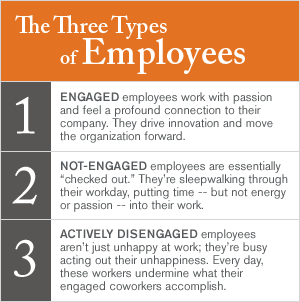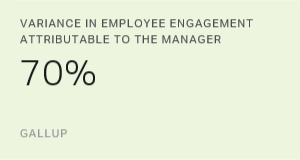According to a study published by Gallup, only 13% of the German workforce is committed to the job, and 20% is actively disengaged. Strategic consultant Marco Nink does not blame the affected employees for this. He believes that it is a poor corporate culture that discourages personnel, as he discusses in this interview.
MAN Forum: Mr. Nink, over the last eight years [Gallup] research has indicated that a large number of employees in Western industrialized nations have withdrawn into some form of inward resignation. How do highly motivated people become disengaged from their work?
Very few employees leave a company just because of compensation. Quitting is almost always a statement against the immediate superior.

Marco Nink: In that their needs and expectations at work are simply ignored over a longer period of time. The issue is as simple as not asking for their opinions, not offering them feedback, showing no interest in them as human beings or asking them to do a job that does not really suit them.
The immediate supervisor almost always plays the primary role. For our most recent study, we asked employees if they would fire their current supervisor if they could. [Four in 10 (38%) of actively disengaged] employees would do so -- and I suspect with the greatest pleasure. Very few employees leave a company just because of compensation or because they are not promoted.
Quitting is almost always a statement against the immediate superior. It is a deadening process: Many employees are highly motivated when joining a company but then become increasingly disillusioned. And when continuously neglected, they will switch off at some point. They will resign inwardly, so to speak. This doesn't happen overnight, but occurs rather as a process, due to experiences during the routine workday.
MAN Forum: Well, as long as they continue to do their job, it is not really a problem for the company, is it?
Nink: Actually, yes, it is, [because] the motivation level of employees has tangible economic ramifications for the company. In the group of engaged employees, there are lower rates of theft, fewer defective products, fewer work accidents, less employee turnover and lower levels of absenteeism. And those are only the direct costs. From our research, we know that motivated employees also work more productively, are more innovative and more responsive to customers. All these factors serve to increase the company's profitability. In short: Highly engaged and motivated employees are also the ones with an elevated sense of emotional connection to their jobs.

MAN Forum: Does this always reflect on the company? Or do some employees simply not feel like working anymore at some point?
Nink: That is a false conclusion. Not-engaged employees are not necessarily lazy. One interesting detail resulting from our study is the response to the question, "If you were to inherit enough money to no longer need to work, would you continue with your job or would you quit?" As many as seven out of ten employees in Germany would not resign despite an inheritance that would provide them a financially carefree life. This percentage has been stable since the study's onset in 2001.
In my opinion, this definitely indicates the fundamentally positive relationship between Germans and their work. Even two-thirds of those about to retire would continue working despite a large inheritance.
MAN Forum: Comparing the percentage of highly motivated employees on an international scale reveals some big differences: The workforce in English-speaking countries is the most motivated; continental Europe is in the middle, and Asian countries trail behind. Are American employees more easily appeased than the Japanese?
Nink: No. The needs of employees are the same around the world. They want praise and recognition for good work, for instance; [this is] a central motivational factor. This finding might sound trivial, but is executed too rarely. Germany, for example, has a culture of superiors who believe that not scolding is sufficient praise. People, however, want to receive recognition when it is appropriate.
The differences result from the predominant corporate culture and organization. In English-speaking countries, the hierarchies are often flatter, which encourages open communication between supervisors and staff. Six out of ten employees in Germany describe their management as patronizing, according to the motto "Here, I'm the boss." In English-speaking countries in contrast, the majority feels considered as partners.
MAN Forum: And in Asia? In those cultures, the image of the company as family continues to be celebrated in public. They eat together and outwardly identify themselves completely with the company. The large number of not-engaged employees there does not really fit this image …
Nink: No. It is true that to outsiders, employees communicate the impression of extreme loyalty there. In Asia however, the hierarchies are even steeper than in Germany. Since our survey is anonymous, the people's real frame of mind comes to the fore.
India represents an exception, because many companies, in particular in the large cities where the survey was conducted, show an "American influence," which is also related to the fact that many Indian executives attended universities in the United States. There, they have internalized the importance of the human factor, which already accommodates the Indian mentality and is accepted benevolently.
When you ask supervisors, they believe that they are doing everything right. Yet speaking with your people during an employee meeting once a year is not enough.

MAN Forum: On the other hand, it could be suspected that Scandinavians are likewise fairly motivated, which has so far not been recorded in your study. After all, companies in these countries are considered particularly employee-friendly …
Nink: No. It can be assumed that the basic conditions in Scandinavia are very good -- with regard to flexible work hours and a high emphasis on the family. Whether employees are motivated or not lies within the powers of the immediate boss.
MAN Forum: Then, why do so few managers appear able to really motivate their people?
Nink: When you ask supervisors, they believe that they are doing everything right. Yet patting your people on the back in passing or speaking with them during an employee meeting once a year is not enough. The problem is that people management is not paid enough attention to during the course of management education. The 'Master of Business Administration' title alone implies that the training is about managing and administrating.
One should also investigate which criteria are used to promote people in a company: Whoever works for a long time in the company moves ahead. Or someone is an expert in a certain field and is rewarded with a management position. In this respect, the best sales person can also be the worst manager.
MAN Forum: Let us assume that a manager recognizes these deficiencies. What can they do to re-motivate employees for their work?
Nink: They could at least pull back those individuals who merely do their work by the book. These employees consider the situation at least tolerable. Bosses should ask staff members much more often for their opinions -- which does not mean that decisions are actually always made according to those views.
Employees want fact-based and objective praise, as well as real enthusiasm and interest in them as people. It is wholly inappropriate to pour praise on everyone indiscriminately. I know of one company, where a single-parent mother had problems with her son, who was having problems in school with one particular subject. The female supervisor rewarded her with a tutoring course in recognition of her excellent performance. That really shows true interest in the employee, wouldn't you think so?
This article is adapted from one originally published in the September 2009 edition of MAN Forum. Reprinted with permission.
